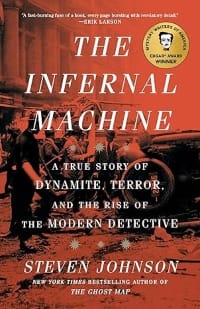
Estimated reading time: 8 minutes
Key Takeaways
- In The Infernal Machine, Steven Johnson chronicles the rise of modern detectives and the anarchist movement in the late 19th and early 20th centuries.
- The book highlights how detectives began using information to solve crimes rather than brute force, reflecting a shift in law enforcement methods.
- Johnson explores the historical impact of anarchism and its key figures, emphasizing a connection between ideology and police evolution.
- The narrative captivates with its depiction of an era marked by dynamite’s destructive power and the struggle between The People and The Establishment.
- Overall, The Infernal Machine provides fascinating insights into a transformative period in history in an engaging and accessible manner.
Short Summary
Steven Johnson has shown himself quite apt at offering his readers detailed and nuanced insight into specific fragments of our history, a feat he accomplished yet again with his 2024 book titled The Infernal Machine. Briefly-said, in this book he chronicles the rise of modern detectives, the kind who use information rather than brute force to achieve their goals, as well as the Anarchist movement, which is what ultimately led to their appearance.
Table of contents
Steven Johnson Presents an Era of Breakthroughs
When it becomes a question of studying history, one always has to settle on a specific target; learning the entirety of it from start to finish is unlikely to be possible anymore. With people picking and choosing what to focus on, many smaller periods of our history have been pushed into the shadows by the monumental events towering over them. In The Infernal Machine, Steven Johnson explores such a time and place, namely marked by explosions and political ideologies.
More precisely, it always felt to me like the first half of the twentieth century was overshadowed by the second one, largely because of World War II and the rapid technological developments which followed. It’s easy to forget that not so long ago, only a few generations back, the world looked and worked in a vastly different fashion, and what’s more, was undergoing a period of extremely turbulent changes across the spectrum.
The book jumps back and forth in time, remaining generally concentrated on the late 19th and early 20th centuries, with the author taking it upon himself to chronicle down to the last details the course of events which led to the rise of modern detectives. By that, I’m referring to the kinds of detectives who use information to solve crimes, rather than beating confessions out of their suspects. To this end, Johnson dives into the historical context surrounding police-work in general back then.
Not only limiting himself to the United States, he also explores how various police forces across Europe were developing in parallel, and perhaps more importantly, what exactly their development was in response to… that is to say, two elements: political ideology and dynamite. Though he may no longer be remembered for it, Alfred Nobel’s explosive invention paved the way for a century of assassinations and reforms.
Indeed, Johnson takes a profound dive into the world of anarchism, exploring the lives of its early leaders such as Kropotkin, Berkman and Goldman, and how their words (and in some cases, actions) ushered in a new era marked by a fight between The People and The Establishment. Without seeking to justify nor condemn, Johnson uses their stories to explain the shift experienced by the world back then, as well as the immense pressure which forced law enforcement agencies to re-brand themselves forever.
An Ideology Given Justice in The Infernal Machine
I’ll be honest in saying that before diving into this novel, I was far from being well-versed in the history of anarchism, its players, and the nuances of the philosophy itself. Like most people nowadays, at least I must assume, the term “anarchist” conjures up the imagine of an angry leather-clad protester intent on committing some sweet vandalism amidst any sort of protest. However, at its core, the ideology is one calling for peace.
Steven Johnson dedicates much of The Infernal Machine to exploring the Anarchist ideology as it was perceived back then, so that we not only get to know how history unfolded, but also what exactly pushed the people back then to make the decisions they did. I think the author does a marvellous job at shedding some light on the root and core principles of anarchism, the ones focusing on “Mutual Aid”, a concept observed in nature.
Johnson allows us to see people such as Alexander Berkman and Emma Goldman in a different light than most are probably intent on remembering them, showing them as people driven by deep, unshakable convictions hoping to fight the rising tyranny of industrialization. Though inherently they did want a violent world, there were times when violence was the only option they saw available to them.
I believe the author did a magnificent job in contextualizing the thoughts and ideas driving the anarchist movement, allowing us to at least understand how they determined the cost of their actions. Their perspectives are given the weight they deserve, and with a bit of imagination, it becomes easy to see how they perceived the few who died to dynamite as nothing compared to the thousands of yearly casualties brought upon the country by industrialization and a lack of safety measures.
Whether you agree or disagree with the ideals of the movement, I think ultimately, Steven Johnson achieves what he set out to do: to make the reader understand why anarchism made sense back then, and how people were swept up by its values. Perhaps more importantly considering the subject of the book, he draws the connection between the movement with its increasingly violent ways and the evolution of police-work.

From Thugs to Scientists
Interspersed with the narrative about the rise of the anarchist movement is also a chronicle of the how the American police force developed in response to it. Steven Johnson pulls no punches in The Infernal Machine, describing the force in its early days as being little more than a bunch of thugs serving the highest bidders. Between detectives who only knew to beat out confessions and Pinkerton agents working as lethal strike breakers for J.P. Morgan, there wasn’t much trust from the public to go around.
However, with the detonation of titular infernal machines becoming an increasingly common event, especially in New York, there was a definite need for change. As it happens, the prototype for this change would come from abroad, where French and Italian law enforcement agencies were already using information as their main weapon, cataloguing criminals with Alphonse Bertillon‘s system and using intellect rather than brute strength.
Steven Johnson does a wonderful job at showing the painfully slow-yet-effective transition of the New York police detective force from a gang of hardened brutes to sharp-minded scientists. We get to see how slowly but surely, the brain work of a few won over the antiquated views of the higher-ups, how finesse became called for over strength.
I must admit I found it thoroughly fascinating to witness how the things we take for granted today first came into existence, such as undercover operations, fingerprinting and wiretapping, just to name a few. Johnson makes it easy to understand how much of a breakthrough such things were back then, to the point where they tipped the scales of the fight between law enforcement and anarchists heavily into the former’s favour.
Along the way we get to make the acquaintance of quite a few celebrated figures, including J. Edgar Hoover, Arthur H. Woods , Joseph Faurot, and even Amadeo Poignant, the first undercover detective in American history, having served on the famous Italian Squad. Just like for the anarchists, Steven Johnson shows us their side of the story, the thoughts and ideals they held close to heat which pushed them onward to a type of fight the world had never seen before.

| PAGES | PUBLISHER | PUB. DATE | ISBN |
|---|---|---|---|
| 368 | Crown | April 29 2025 | 978-0593443972 |
The Final Verdict
The Infernal Machine by Steven Johnson truly is an engrossing and riveting account of a period in our modern history which may have fallen into the shadows, showing a world changed forever by the explosive power of dynamite combined with ideological freedom. What’s more, it’s narrated with a rather easy prose and the author doesn’t get bogged down in useless details. All in all, it’s the perfect history book, at least in my opinion.
If the rise of the modern detectives as they were facing off against the anarchist movement sounds like the kind of history you’d enjoy learning more about, then I’m confident in saying you probably won’t find a better book to launch yourself into subject with. It’s full of fascinating insights bound to instill a lasting curiosity in the matter, or at least, it has for me.

